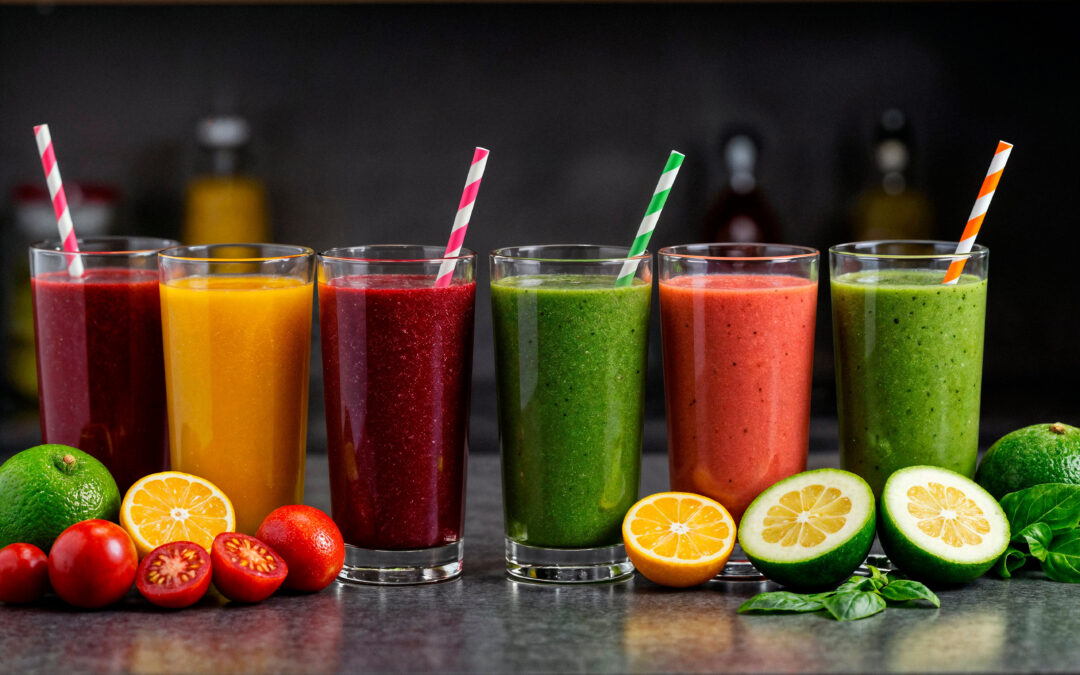Smoothies for Better Sleep and Daytime Energy: A Natural Approach to Restoring Balance
Sleep difficulties and low energy are among the most common complaints for adults today. Many people turn to sleeping pills, stimulants, or caffeine for relief, but research shows that food-based solutions may be a safer and more sustainable option. Nutrient-rich smoothies made with carefully selected fruits, vegetables, nuts, and seeds can help reset the body’s natural rhythms, support hormone balance, and calm the nervous system.
In this post, we’ll explore science-backed daytime smoothies for energy and evening smoothies for restful sleep, using accessible ingredients like papaya, banana, almonds, grapes, chia seeds, and spinach.
Daytime Energy Smoothies
During the day, the body needs foods that boost alertness, stabilize blood sugar, and support steady energy without the crash of caffeine or processed sugar.
1. Beetroot-Carrot Vitality Smoothie
Ingredients:
-
½ cup cooked beetroot (rich in nitrates, supports blood flow and stamina)
-
1 carrot (beta-carotene and antioxidants)
-
½ apple
-
Small piece fresh ginger (anti-inflammatory, energizing)
-
½ tsp turmeric + pinch black pepper (to activate curcumin)
-
Water or coconut water
Why it works:
Beetroot juice has been shown to improve oxygen efficiency and stamina in adults (Bailey et al., 2009, Journal of Applied Physiology). Combined with ginger and turmeric, this blend supports both energy and mental clarity.
2. Broccoli-Cabbage Green Energizer
Ingredients:
-
1 handful broccoli florets (rich in vitamin C and sulforaphane for detoxification)
-
1 handful cabbage (antioxidants + magnesium)
-
½ cucumber (hydration)
-
½ green apple
-
1 tbsp chia seeds (omega-3s for brain energy)
Why it works:
Cruciferous vegetables like broccoli and cabbage contain compounds that support liver detoxification, which is essential for hormone balance and sustained energy. Chia seeds provide plant-based omega-3s and magnesium, shown to improve fatigue and mood (Da Silva et al., 2018, Nutrients).
3. Watermelon-Coconut Hydration Smoothie
Ingredients:
-
1 cup watermelon (hydration + citrulline for circulation)
-
½ cup coconut water
-
½ cup pineapple (digestive support)
-
Tiny piece ginger
Why it works:
Dehydration is a hidden cause of fatigue. Watermelon and coconut water are powerful hydrators, while pineapple aids digestion so the body can efficiently use nutrients for energy.
When to drink: Morning or mid-afternoon for an energy boost.
Evening & Sleep Smoothies
In the evening, the goal is to calm the nervous system, support melatonin release, and reduce digestive stress. Smoothies should be light, magnesium-rich, and supportive of serotonin and sleep hormones.
1. Banana-Almond Dream Smoothie
Ingredients:
-
1 banana (tryptophan and magnesium to support sleep)
-
1 handful spinach (magnesium, calcium)
-
6–8 almonds (healthy fats + magnesium)
-
1 date (natural sweetness, serotonin support)
-
½ cup coconut water
-
1 tsp chia seeds
Why it works:
Bananas and almonds provide magnesium and tryptophan, both linked to improved sleep onset. A 2019 review in Nutrients confirmed that dietary magnesium improves sleep quality in adults, especially those with insomnia.
2. Papaya-Pineapple Calm Blend
Ingredients:
-
1 cup papaya (vitamin C helps regulate cortisol)
-
½ cup pineapple (contains melatonin and bromelain for digestion)
-
½ avocado (healthy fats, magnesium)
-
½ cup spinach or waterleaf
-
Small slice ginger (optional for gut health)
Why it works:
Research published in the Journal of Pineal Research (Maldonado et al., 2009) shows that pineapple may significantly increase natural melatonin levels, promoting better sleep. Combined with papaya and avocado, this smoothie is digestion-friendly and calming.
3. Grape-Cucumber Serenity Smoothie
Ingredients:
-
½ cup grapes (contain natural melatonin)
-
½ cucumber (hydration, cooling effect)
-
½ apple
-
1 tsp chia seeds
-
½ cup coconut water
Why it works:
Grapes, particularly red and purple varieties, are one of the few fruits with natural melatonin. A study by Iriti et al. (2006, Journal of Pineal Research) found that grape intake can increase circulating melatonin, supporting circadian rhythm regulation.
When to drink:
-
Dinner-time blends (like papaya-pineapple or beetroot-based) → 2–3 hrs before bed
-
Bedtime blends (like banana-almond or grape-based) → 30–60 min before sleep
Balancing Day and Night
-
Daytime smoothies focus on energy, circulation, hydration, and detoxification (beetroot, broccoli, carrot, ginger, watermelon).
-
Evening smoothies focus on magnesium, tryptophan, melatonin, and digestion (banana, spinach, grapes, almonds, chia seeds).
-
What to avoid at night: Garlic, turmeric (stimulating in large amounts), high-water fruits like watermelon (can cause frequent urination), and fibrous veggies like cabbage or broccoli.
Final Thoughts
Food is not a magic cure, but it is a powerful regulator of body rhythms. By pairing daytime energizing smoothies with evening sleep smoothies, adults struggling with insomnia or fatigue can gently retrain their body toward balance.
Unlike medication, which often only addresses symptoms, these smoothies nourish the underlying systems:
-
Nervous system (magnesium, omega-3s)
-
Hormones (tryptophan, melatonin, cortisol balance)
-
Digestion (bromelain, papaya enzymes)
-
Circulation (nitrates from beetroot, citrulline from watermelon)
Consistently practiced, this can be a natural way to reclaim restorative sleep and vibrant daytime energy.
Disclaimer: This content is for educational purposes only and not a substitute for medical advice. If insomnia persists, consult a qualified healthcare provider.

